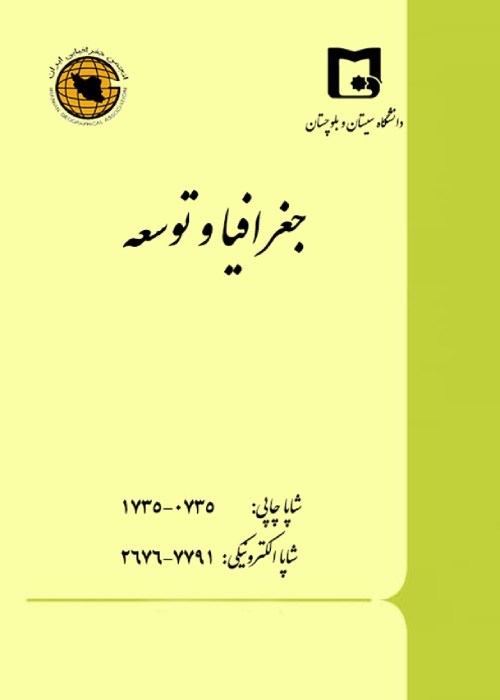Determination of Psychological Factors Affecting Climate Change Risk Perception Among Agricultural Extension Experts and Agents of Khuzestan Province
Climate change is expected to have serious economic and social impacts, particularly on rural farmers. Agricultural production and access to food could be severely compromised by climate change. Climate change results in an increase in extreme weather events such as floods and droughts and increased global temperature, as well. In addition, Potential increase in droughts disturbs not only the water resources but also agriculture and consequently, food security. Adaptation is a viable option to reducing vulnerability towards negative impacts of Climate Change. Studies show that without adaptation, climate change may create considerable problems related to agricultural production and agricultural economies and communities in many areas; but with adaptation, vulnerability can be reduced. Access to agricultural extension as a source of information affects adaptation to climate change. The agricultural extension workers are expected to be the principal stakeholders to teach farmers how to adaptation with climate change. it is also to be expected that public perceptions of the threat posed by climate change, and support for adaptation policies, will vary across countries. Therefore, this work explores risk perception of extension experts and agents and factors influencing it, regarding climate change.
Methods and material: This research in terms of purpose is applied and in terms of data collection is survey. Statistical population was 400 farmers of agricultural extension experts and agents of Khuzestan province that among them, a sample size of 240 persons whit sampling method of Cluster randomly selected. Data were collected through a questionnaire based on the conceptual model. The face and content validity of the questionnaire was confirmed by a panel of experts. The questionnaires internal reliability was investigated using the Cronbachs alpha coefficient. All scales indicated a good-to excellent reliability index (0.67-0.87).
The results of correlations indicate, perceived risk of climate change was significantly related to the trust in media, environmental attitude, responsibility, self-efficacy, environmental values and psychological distance variables. Also The results showed that, the risk salience and psychological distance did not have a significant effect on risk perception. Environmental attitudes were, in aggregate, the largest determinant of risk perception. These findings affirm prior research showing that environmental risk perception is related to environmental attitudes (Carlton & Jacobson, 2013). Responsibility also was an important driver of risk perception. As expected, respondents who believe they have the responsibility and ability to mitigate the potential adverse impacts of climate change appear to be more perceived about the climate change risks. Prior research has shown that people with high Responsibility tend to perceive climate risks as high (Kellstedt et al., 2008). The negative relationship between self-efficacy and perceived risks is noteworthy. Media and experts trust variables also significantly predict climate change risk perceptions. Our regression model explains approximately 60% of the variance in the dependent variable, which is consistent with other studies predicting environmental and natural hazards perceptions.
Agriculture is vulnerable to global climate change and Adaptation is a viable option to reducing vulnerability towards negative impacts of Climate Change. Agricultural extension experts play a significant role in modern agriculture and work with farmers on numerous decisions ranging from financial to agronomic to conservation-oriented. An understanding of experts beliefs about climate change risk and adaptation is required to inform effective strategies to adaptation. In this study, the factors influencing the risk perceptions of Agricultural extension agents toward the increasing problem of climate change and global warming have been identified. The results showed, Climate change risk perception has been explained by factors such as environmental attitudes, Responsibility, efficacy and media trust and experts trust. This study confirms prior findings in the risk analysis literature that risk perception is influenced by Psychological Factors. Based on these results, it is suggested, by providing more accurate and more up-to-date information for agricultural experts on climate change, its impacts and consequences and about methods of adaptation to it through research organizations or media increased their trust and consequently risk perception.
- حق عضویت دریافتی صرف حمایت از نشریات عضو و نگهداری، تکمیل و توسعه مگیران میشود.
- پرداخت حق اشتراک و دانلود مقالات اجازه بازنشر آن در سایر رسانههای چاپی و دیجیتال را به کاربر نمیدهد.


